| Srl | Item |
| 1 |
ID:
081338
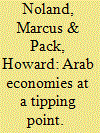

|
|
|
| 2 |
ID:
117474
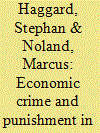

|
|
|
|
|
| Publication |
2012.
|
| Summary/Abstract |
STEPHAN HAGGARD and MARCUS NOLAND describe North Korea's prison system. The system includes not only the infamous penal camps for political prisoners but detention facilities that permit short-run incarceration for economic crimes. They find that those with greater involvement in the market are more likely to face incarceration in such facilities and that the criminalization of economic activity allows the state to extract bribes.
|
|
|
|
|
|
|
|
|
|
|
|
|
|
|
|
| 3 |
ID:
077950
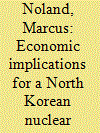

|
|
|
| 4 |
ID:
060206
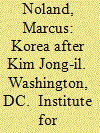

|
|
|
|
|
| Publication |
Washington, DC, Institute For International Economics, 2004.
|
| Description |
xi, 103p.
|
| Standard Number |
088132373X
|
|
|
|
|
|
|
|
|
|
|
|
Copies: C:1/I:0,R:0,Q:0
Circulation
| Accession# | Call# | Current Location | Status | Policy | Location |
| 049430 | 330.9519/NOL 049430 | Main | On Shelf | General | |
|
|
|
|
| 5 |
ID:
081865
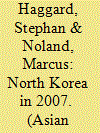

|
|
|
|
|
| Publication |
2008.
|
| Summary/Abstract |
The year 2007 witnessed a gradual rapprochement between North Korea and the world, reflecting changes both in the country's external environment and domestic political economy. Key markers were the resumption of the Six-Party Talks and the second North-South summit. Whether these developments will endure depends largely on North Korean intentions
|
|
|
|
|
|
|
|
|
|
|
|
|
|
|
|
| 6 |
ID:
086683
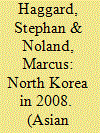

|
|
|
|
|
| Publication |
2009.
|
| Summary/Abstract |
In 2008, North-South relations worsened, food shortages re-emerged, and the Six Party process yielded an interim agreement. The U.S. dropped North Korea from the terrorism list but nuclear verification issues remained contentious. Kim Jong-il reportedly suffered a stroke in August, casting uncertainty over all aspects of politics and policy.
|
|
|
|
|
|
|
|
|
|
|
|
|
|
|
|
| 7 |
ID:
060644
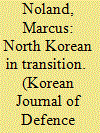

|
|
|
| 8 |
ID:
081498
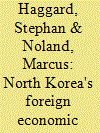

|
|
|
|
|
| Publication |
2008.
|
| Summary/Abstract |
Many debates about engagement with North Korea hinge on the precise nature of North Korea's foreign economic relations: whether trade and investment are on commercial or non-commercial terms; the extent of illicit activities, and the changing geographic patterns of North Korea's trade. This article provides an effort to reconstruct North Korea's foreign economic relations, subordinating our estimates to the discipline of the balance of payments accounting framework. Among the most salient findings for the debate about engagement and sanctions is that North Korea's trade and investment have continued to increase despite the onset of the nuclear crisis and a decline in illicit activities. This growth has occurred in part because of the growing weight of China and South Korea in trade, aid, and investment. We also find that economic relations between North and South Korea have a substantially greater non-commercial component than those occurring across the China-North Korea border
|
|
|
|
|
|
|
|
|
|
|
|
|
|
|
|
| 9 |
ID:
097229
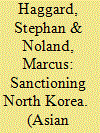

|
|
|
| 10 |
ID:
126266


|
|
|
|
|
| Publication |
2014.
|
| Summary/Abstract |
South Korea's development over the last half century has been nothing short of spectacular. Fifty years ago, the country was poorer than Bolivia and Mozambique; today, it is richer than New Zealand and Spain, with a per capita income of almost $23,000. For 50 years, South Korea's economy has grown by an average of seven percent annually, contracting in only two of those years. In 1996, South Korea joined the Organization for Economic Cooperation and Development, the club of rich industrialized countries, and in 2010, it became the first Asian country and the first non-G-7 member to host a G-20 summit.
|
|
|
|
|
|
|
|
|
|
|
|
|
|
|
|
| 11 |
ID:
090095
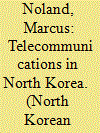

|
|
|
|
|
| Publication |
2009.
|
| Summary/Abstract |
The formation of telecommunications policy poses a difficult challenge for authoritarian regimes: while improvements in telecommunications can contribute to material prosperity, they may also contribute to a loss of control. North Korean policies reveal an ambivalent attitude, driven by conflicting goals of modernization and control. This paper reviews North Korea's telecommunications infrastructure and provides a brief history of North Korean telecommunications policies in a variety of settings, paying particular attention to the recent decision to authorize Orascom, a foreign cellular provider, to provide nationwide cellular service, potentially leapfrogging from North Korea's dilapidated existing systems to a modern system.
|
|
|
|
|
|
|
|
|
|
|
|
|
|
|
|